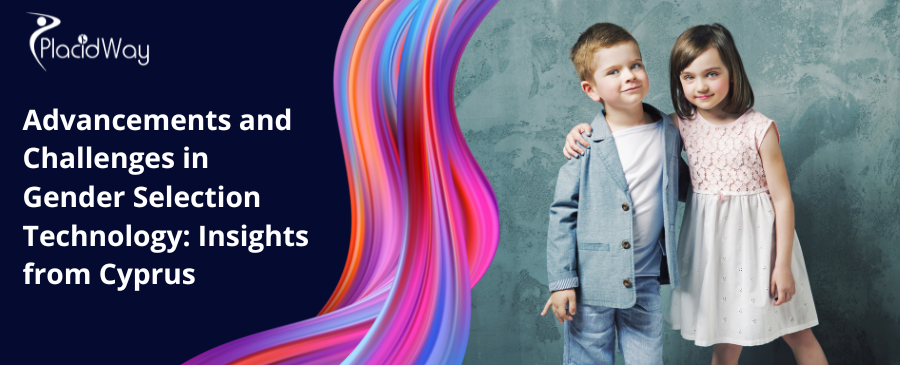Exploring Gender Selection Technology & Challenges in Cyprus

In the last few decades, technology has pushed the boundaries of what's possible in every sphere of life, including the complex world of human reproduction. One area that has seen remarkable progress is gender selection technology. Cyprus, a small island nation in the Mediterranean, has become an unexpected hub for families seeking to choose the sex of their future children, thanks to its advanced medical facilities and liberal legal framework. This blog post delves into the advancements and challenges of gender selection technology, with a special focus on Cyprus, aiming to provide a comprehensive understanding accessible to readers of all ages.
Understanding Gender Selection Technology
Gender selection, also known as sex selection, is a medical process that allows parents to choose the sex of their child. The most common and effective method used for gender selection is Preimplantation Genetic Diagnosis (PGD) in conjunction with In Vitro Fertilization (IVF). PGD involves extracting a cell from an IVF embryo to test for genetic disorders and determine the sex of the embryo before it is implanted in the uterus.
The Journey to Cyprus
Cyprus has become a leading destination for gender selection for various reasons. Its medical tourism industry is supported by state-of-the-art fertility clinics, highly qualified reproductive specialists, and relatively relaxed regulations compared to other countries. Families from around the world, where gender selection might be restricted or banned, turn to Cyprus to fulfill their dreams of balancing their families or ensuring the inheritance of family traits.
Advancements in Gender Selection Technology
The field of gender selection has seen significant technological advancements over the years. Improvements in PGD and IVF techniques have made the processes more efficient and successful. The accuracy of determining the embryo's sex before implantation is nearly 99%, making gender selection highly reliable for prospective parents.
Some of the top clinics are:
Ethical and Social Implications
As technology advances, so does the debate around the ethical and social implications of gender selection. Critics argue that it might contribute to gender imbalances and reinforce gender stereotypes. However, many seeking gender selection in Cyprus do so for family balancing reasons, striving for a more diverse family dynamic rather than preferring one gender over another.
Challenges Facing Gender Selection Technology
Despite its advancements, gender selection technology faces several challenges:
Legal and Regulatory Hurdles
One of the primary challenges is the diverse legal landscape across different countries. While Cyprus offers a relatively permissive environment for gender selection, other countries have stringent regulations or outright bans on the process for non-medical reasons. This discrepancy leads to ethical and legal debates, with concerns about "reproductive tourism" and the implications of circumventing national laws.
The Cost of Dreams
The financial cost of undergoing gender selection through IVF and PGD in Cyprus can be prohibitive for many. The entire process, including travel, accommodation, and medical fees, can amount to a significant sum, limiting access to those with considerable financial resources.
Psychological Considerations
The psychological impact on families undergoing gender selection is another crucial challenge. The pressure of achieving a successful pregnancy, coupled with high expectations regarding the child's gender, can be stressful. Furthermore, the ethical dilemmas surrounding gender preference and family dynamics warrant careful consideration and support from mental health professionals.
Moving Forward: Ethical Considerations and Future Prospects
As gender selection technology continues to evolve, so must our ethical frameworks and regulations. The goal should be to balance the desires of prospective parents with broader societal implications, including gender equality and diversity. Future advancements in technology may address current limitations, making the process more accessible and less invasive. However, the conversation around the ethical, legal, and social dimensions of gender selection must continue, ensuring that progress in this field benefits society as a whole.
Cyprus: A Case Study in Balance
Cyprus serves as an interesting case study in managing the complex interplay between technological advancement, ethical considerations, and legal frameworks. The nation's approach, which allows for gender selection under specific conditions, highlights the potential for nuanced regulations that respect individual choices while considering broader societal impacts.
Get Affordable Family Balancing Treatment in Cyprus
The journey of gender selection technology, particularly as seen through the lens of Cyprus, underscores a fascinating intersection of science, ethics, and law. While the advancements in this field offer incredible opportunities for families, they also present challenges that society must address thoughtfully. As we move forward, the ongoing dialogue between technology, ethics, and regulation will be crucial in navigating the future of gender selection, ensuring it serves the best interests of individuals and society alike.
Gender selection technology embodies the remarkable potential of human innovation to fulfill deep-seated desires for family balance and continuity. However, it also raises important questions about the kind of world we wish to live in and the values we want to uphold. By engaging with these advancements critically and compassionately, we can hope to navigate the complexities of gender selection technology in a way that is equitable, ethical, and respectful of diverse human experiences.



.png)


.png)



.png)
.png)

.png)
